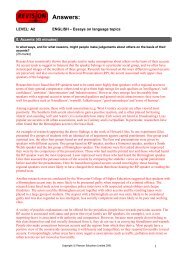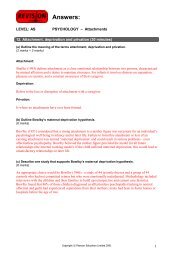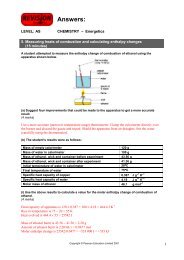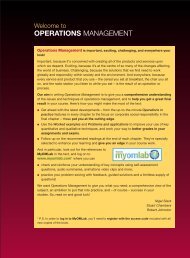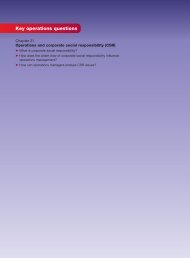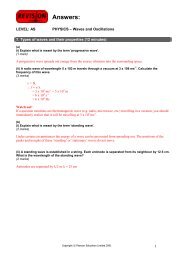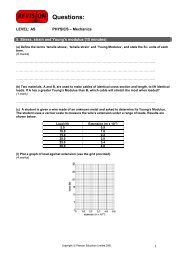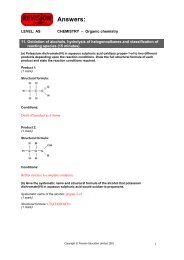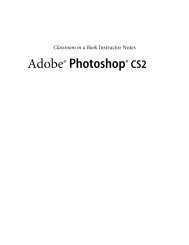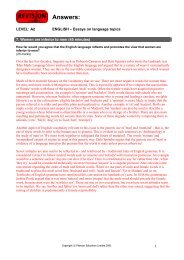The Dove Campaign for Real Beauty - Pearson
The Dove Campaign for Real Beauty - Pearson
The Dove Campaign for Real Beauty - Pearson
You also want an ePaper? Increase the reach of your titles
YUMPU automatically turns print PDFs into web optimized ePapers that Google loves.
Part 1 Marketing now●●●●●Misleading advertising encouraging mothers to bottlefeedtheir babies and showing breast feeding to be oldfashionedand inconvenient.Gifts and samples inducing mothers to bottle-feed theirinfants.Posters and pamphlets in hospitals.Endorsements of bottle-feeding by milk nurses.Formula so expensive that poor customers dilute tonon-nutritious levels.A WHO code eliminates all promotional ef<strong>for</strong>ts,requiring companies to serve primarily as passive ‘ordertakers’. It prohibits advertising, samples and directcontact with consumers. Contacts with professionals(such as doctors) occur only if professionals seek suchcontact. Manufacturers can package products with some<strong>for</strong>m of visual corporate identity, but they cannot picturebabies. <strong>The</strong> WHO code effectively allows almost nomarketing. However, the code contains onlyrecommended guidelines. <strong>The</strong>y become mandatory only ifindividual governments adopt national codes throughtheir own regulatory mechanisms.WHO allows the donation of free or low-cost suppliesof infant <strong>for</strong>mulas <strong>for</strong> infants who cannot be breast-fed.However, the International Association of Infant FoodManufacturers (IFM) is working with WHO and UNICEF tosecure country-by-country agreements with countries toend free and low-cost supplies.Nestlé itself has a policy on low-cost supplies indeveloping countries, as follows:●●●●Where there is government agreement, Nestlé willstrictly apply the terms of that agreement.Where there is no agreement Nestlé, in cooperationwith others, will be active in trying to secure earlygovernment action.Where other companies break an agreement, Nestléwill work with IFM and governments to stop thebreach.Nestlé will take disciplinary measures against anyNestlé personnel or distributors who deliberatelyviolate Nestlé policy.Given the repeated public relations problems thatNestlé faces, why does it not take unilateral action inending free supplies? Since the Third World infant<strong>for</strong>mula market is so small compared with Nestlé’sworldwide interests, why bother with it?Part of the answer is in Henri Nestlé’s desire ‘to savea child’s life’. <strong>The</strong> European Commission’s directive onbaby food concludes that infant <strong>for</strong>mula is ‘the onlyprocessed foodstuff that wholly satisfies the nutritionalrequirements of infants’ first four to six months of life.’In addition, a recent study by the American DieteticAssociation concluded that ‘on average, babies of 6 to8 months who are fed with human milk receive less than50% of the Recommended Daily Allowance (RDA) <strong>for</strong> ironand zinc, and less than 50% of the Adequate Intake (AI)<strong>for</strong> manganese, fluoride, vitamin D, vitamin B6, niacin,vitamin E, magnesium, phosphorus, biotin and thiamine.’Another consideration is that the campaigns by NorthEuropean activists have little impact on Nestlé sales,especially among poor people – a market that bothNestlé and Unilever are developing.Few mothers in countries with very high infantmortality rates use anything other than breast milk.However, Kenya is probably typical of what happenswhen mothers do supplement breast milk with somethingelse:●●●●●●33 per cent use uji, a local food made from maize;33 per cent use cow’s milk;28 per cent use water;14 per cent use glucose;11 per cent use milk powder, of which some is infant<strong>for</strong>mula;3 per cent use tea.A study in the Ivory Coast shows the sort of problemsthat arise when Nestlé withdraws unilaterally. Othercompanies replaced the supplies to the affluent privatenurseries, but supplies <strong>for</strong> mothers in need collapsed.As a result the main hospital was not able to ‘af<strong>for</strong>d tobuy enough to feed abandoned babies or those whosemothers are ill’.Questions1. Was and is Nestlé’s and the other IFM members’ marketingof infant <strong>for</strong>mula ‘unethical and immoral’?2. Is it the case that ethical standards should be the responsibilityof organisations such as WHO and UNESCO, andthat the sole responsibility of firms is to work within thebounds set?3. Is Nestlé just unlucky or did its actions precipitate its beingsingled out by activists? Is the activists’ focus on Nestléunjust and itself dangerous? What accounts <strong>for</strong> Nestlé’scontinuing in the infant <strong>for</strong>mula market despite theprotests?4. Did Nestlé benefit from confronting the activists directly incourt and winning? Should firms ever confront activistsdirectly? What other <strong>for</strong>ms of action are available to the122



